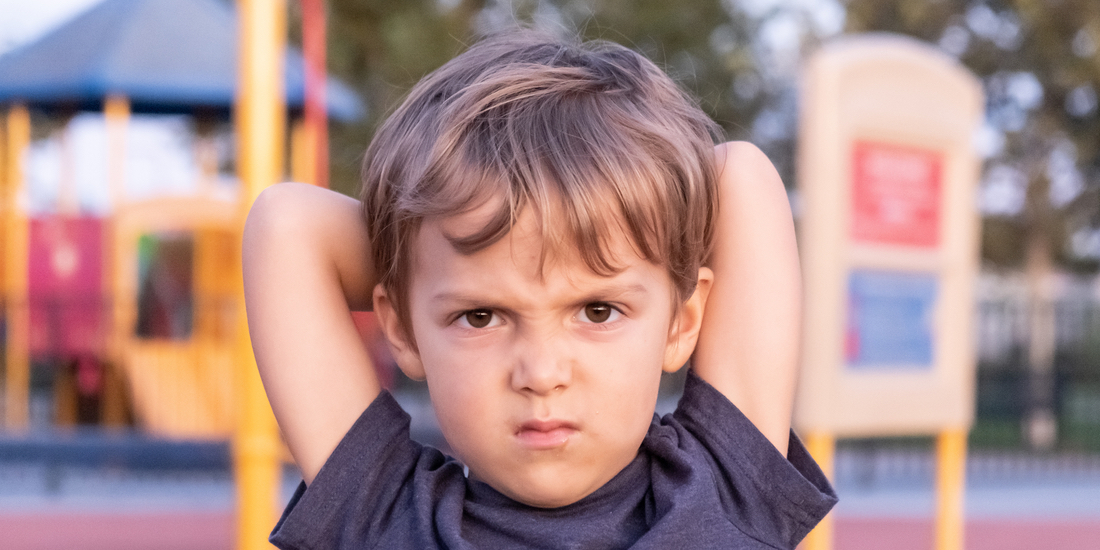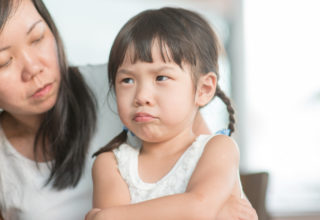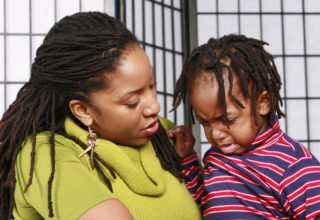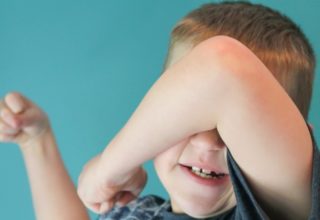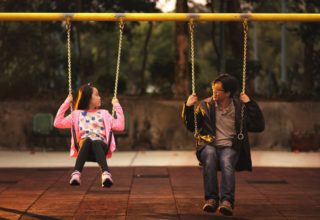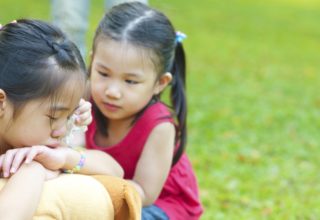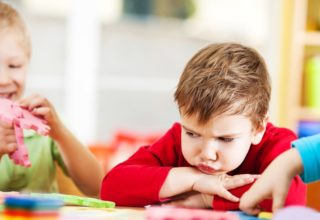Discover how your child’s brain and body are emotionally and physically processing their anger, and strategies and tools to help them manage through it.
Learn
Every child gets ‘angry’ – it is a normal and expected emotion. But it is also a physiological reaction. Caregivers often wonder, “How much is too much?” or “How can I support my child to help them learn to self-manage their anger?” We suggest that if you first understand what is happening with your child physiologically, then you are able to more meaningfully engage with your child and teach them the self-coping skills to move through their anger.
What Happens to My Child’s Body and Brain When They Get Angry?
Anger is a strong emotional and physical outburst that happens when your child’s sympathetic nervous system goes into ‘fight’ mode due to an obvious (conscious) or hidden (subconscious) threat.
Your child’s body physically changes when angry. When your child is experiencing a full emotional expression of anger, it is all-consuming – literally involving the body and the brain.
- Adrenaline surges, heart rate increases, muscles tighten, body temperature and blood pressure rise.
- We have colorful, figurative language to describe what our bodies go through when we get angry: “My blood is boiling!” “I’m about to explode!” and “They’re going to blow their top!”
- Access to rational thinking and problem-solving is unavailable.
- All of your child’s brain resources leave the prefrontal cortex (the most evolved part of our brains where higher-level thinking happens) and instead, the amygdala is activated.
- The amygdala is the part of the brain that goes into high-alert and acts as an emotional alarm system, warning of danger or threat.
- From an evolutionary perspective, this helped us survive out in the wilderness. When confronted with life-threatening danger, we needed to shift all of our resources to survival mode. Vitals would spike, giving us the energy to mobilize and either run away from or fight the threat.
- Human beings still hold these ingrained survival response patterns, and our bodies and brains instinctively react as though there is a life-threat in front of us even when there may not be.
- When the amygdala perceives threat or discomfort, its job is to protect us and go into survival mode, which may look like anger for many children.
Is It Normal for My Child to Become Angry?
- Anger is an expected emotional response in certain situations. It may happen as the result of frustration build-up that leads to a big reaction.
- For example, if your child is trying to create a tall tower of blocks and it keeps falling down, their frustration may snowball each time the tower falls and they have to start over again. This can lead to an angry outburst due to the mounting frustration of not achieving a desired goal.
- Anger can be an outward manifestation of other covert emotions and/or discomfort.* This includes:
- Affective emotions – Emotions that involve our moods, such as anxiety, embarrassment, shame, hurt, disappointment, sadness, etc); and
- Homeostatic emotions – Emotions that involve our basic body needs such as hunger, thirst, pain, exhaustion, illness, needing to go to the bathroom, etc).
- Some children exhibit anger more frequently and with greater intensity than others. The reason can be a complex combination of factors. It is important to consider both your child’s individual differences as well as family and environmental influences.^
- Individual differences – Natural temperament, development, cognitive abilities, health-related issues and/or neurological disorders may affect how your child is internally ‘wired’ to process and manage emotions.
- Some children are ‘wired’ with reduced frustration tolerance and/or impulse control which can affect their emotional regulation skills.
- Family and environmental influences – Children will often model behaviors that they witness, whether it is from the media, from the grown-ups in their lives, from their siblings or other family members, or from other children. If a parent struggles with their own emotional regulation skills, this can contribute to how their child copes with difficult situations and emotions.
- Individual differences – Natural temperament, development, cognitive abilities, health-related issues and/or neurological disorders may affect how your child is internally ‘wired’ to process and manage emotions.
- If your child exhibits anger more frequently and with greater intensity than others, it is important to do some investigating to recognize patterns and discover any underlying causes.
- It is also important to consider underdeveloped skills your child might need to build which may be contributing to their anger outbursts.
- Your child may need to build their emotional vocabulary, practice using language to talk about their emotions, or develop their metacognition and executive functioning capacities.
- Examples of underdeveloped skills include:
- Emotional awareness: Being able to recognize and label emotions.
- Interoception: Noticing bodily sensations that provide clues of internal emotional states.
- Emotional regulation: Using strategies to manage emotional states.
- Empathy and perspective-taking: Understanding the thoughts and feelings of others, and how your behavior impacts others.
- Cognitive flexibility: The ability to adapt to new information, consider different solutions to problems or think of different ways to act/respond.
- Response inhibition: The ability to pause and think before acting.
- Initiation: The ability to recognize when you need help and to ask for help.
- Expressive language: The ability to use language effectively to describe internal states, intentions, desires, thoughts and feelings.
More articles and a roadmap for understanding your child’s brain angry behaviors:
—
Citation references:

Linda Groszyk, Early Childhood Professional
Linda Groszyk, M.S., CCC-SLP is a social cognitive specialist and a nationally certified speech-language pathologist who specializes in social communication, executive functioning, emotional regulation and accent modification. Her passion is to help people of all ages develop their self-awareness and ability to connect authentically with others. Developing her expertise over the past 20 years, Linda spent the first part of her career working in the public school setting and she now works in her own private practice, ProSocialCoach.com. Linda graduated from Boston College with a Bachelor of Arts in Human Development and earned her Master of Science degree in Communication Disorders at Pennsylvania State University.
Identify what anger looks like across different developmental ages and understand what is a typical anger expression and what is...
Key strategies and tools to use before, during and after your child’s angry outbursts – all in a simple printable...
Answers to common questions about handling a child’s angry behaviors. From, “How do I know what is normal?” to “My...
Learn why it is important for your child to be able to identify their emotions, and help them build their...
‘Sensory processing development’ is vital to understanding how children learn. It is deeply studied among early childhood experts, but not...
A go-to list of calming strategies that your child can independently use to get back on track when they feel...
‘Executive functioning’ is a phrase often cited when talking about child development. But what does it really mean and how...
Nuts + bolts; let’s get tactical. Now that we’ve baselined the three primary processes of executive functioning, let’s look at...
It may feel like a number of impulsive behaviors are seemingly normal for children. But what is ‘normal’? In this...
Brain differences make it hard for a child to control their behavior. Understanding your child’s impulsive behaviors can help you...
Empower your child to manage their emotions and regain control in heated situations with *STOP!*
A breathing exercise to help your child move through the rocky moments in their day. Easy to do and remember....
The benefits of mindfulness and how it can help your child thrive. How to naturally and authentically infuse mindfulness into...
Help your child to control their thoughts by making Mindful Minutes a routine. Your step-by-step guide on why, how and...
“Empathy is when you’re able to understand and care about how someone else is feeling.” -Mark Ruffalo, Sesame Street
A classroom favorite for cultivating empathy, kindness, community membership and awareness of others. What’s a real superhero? Someone who helps...
Here’s a practical tool and script to support your child’s self-regulation and emotional awareness – it provides a shared language to signal...
Make a go-to place for your child to find comfort and safety when their internal engines feel out-of-sorts. Whether you...
By learning why young children hit – learning what is developmentally going on in their brains when they hit –...
Knowing why a child hits is the first step in handling a challenging ‘hitting’ situation. Next, how should you respond...
